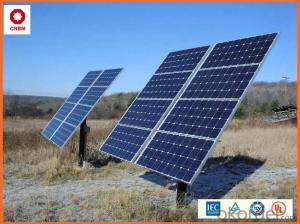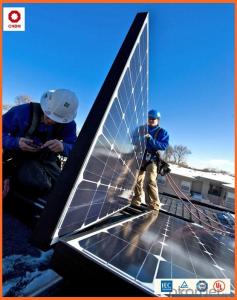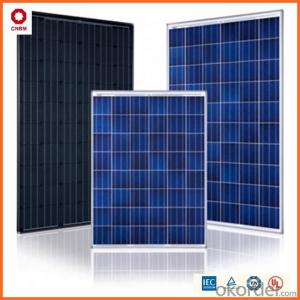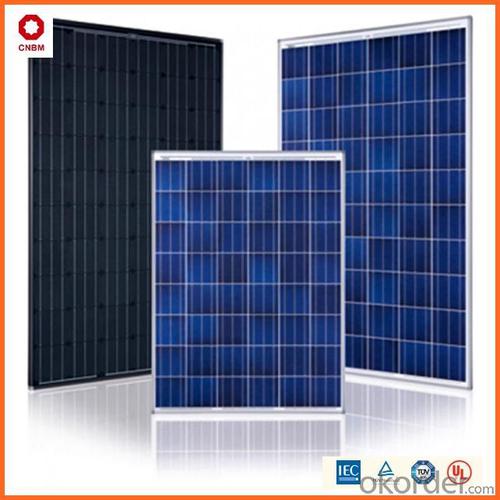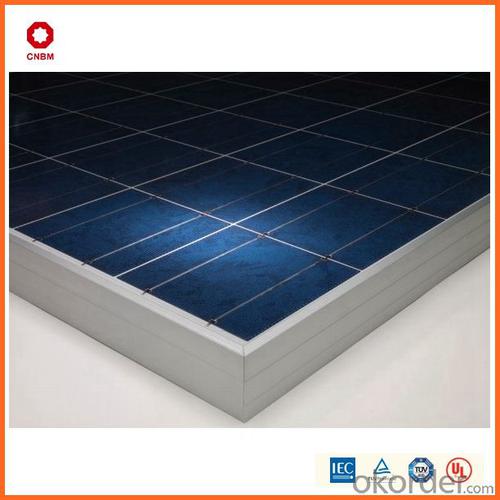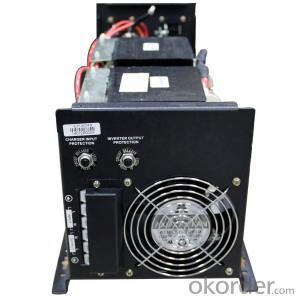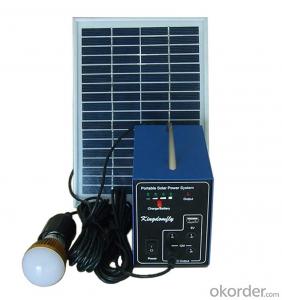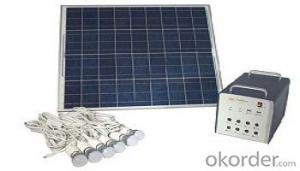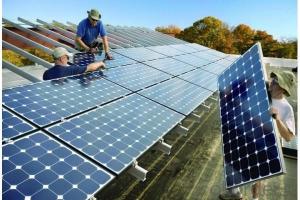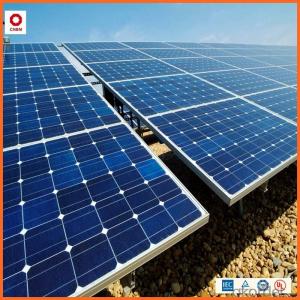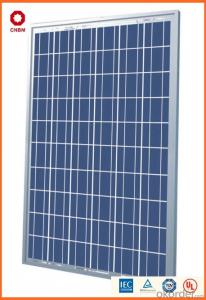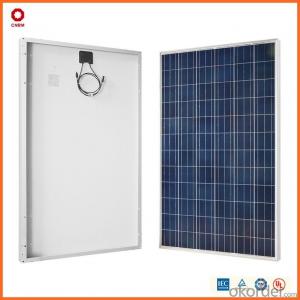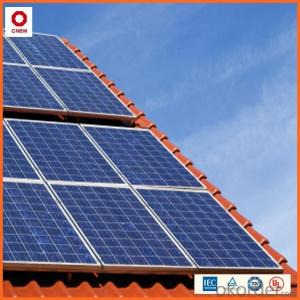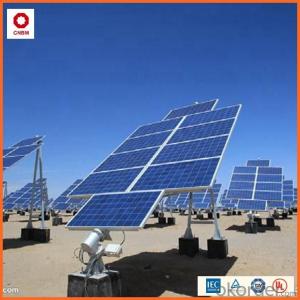Solar Energy Systems Minnesota - !!! Hot on Sale!!! Stock 320W Poly Solar Panel USD0.46/W A Grade Good Solar Panel On Sale
- Loading Port:
- China main port
- Payment Terms:
- TT OR LC
- Min Order Qty:
- 1 watt
- Supply Capability:
- 10000000 watt/month
OKorder Service Pledge
OKorder Financial Service
You Might Also Like
Product Description:
Hot Sale !!! Quality and Safety of 245w-320w Poly Solar Panel
1. Rigorous quality control meets the highest international standards.
2. High-transmissivity low-iron tempered glass, strong aluminium frame.
3. Using UV-resistant silicon.
4. IS09001/14001/CE/TUV/UL
Warranties of 245w-320w Poly Solar Panel
1. 10 years limited product warranty
2. 15 years at 90% of the minimal rated power output
3. 25 years at 80% of the minimal rated power output
Technical date of 245w-320w Poly Solar Panel
ITEM NO.: | Mono 125*125 cell ,36pcs . Power range from 80Wp-100Wp | ||||||||
Maximum Power(W) | 80 | 85 | 90 | 95 | 100 | ||||
Optimum Power Voltage(Vmp) | 17.81 | 17.89 | 17.94 | 17.99 | 18.06 | ||||
Optimum Operatige Current(Imp) | 4.78 | 4.91 | 5.12 | 5.35 | 5.59 | ||||
Open Circuit Voltage(Voc) | 21.98 | 22.05 | 22.14 | 22.28 | 22.45 | ||||
Short Circuit Current(Isc) | 4.95 | 5.15 | 5.36 | 5.65 | 5.84 | ||||
Solar Cell: | 125*125 Mono | ||||||||
Number of Cell(pcs) | 4*9 | ||||||||
Brand Name of Solar Cells | JA Cell, Bluesun Cell | ||||||||
Size of Module(mm) | 1580*808*35 | ||||||||
Caple & Connector Type | Pass the TUV Certificate | ||||||||
Frame(Material Corners,etc.) | Aluminium-alloy | ||||||||
Backing (Brand Type) | TPT | ||||||||
Cell Efficiency for 100W(%) | 15.8% | ||||||||
Weight Per Piece(KG) | 12.0KG | ||||||||
FF (%) | 70-76% | ||||||||
Junction Box Type | Pass the TUV Certificate | ||||||||
Tolerance Wattage(e.g.+/-5%) | ±3%, or 0-3% | ||||||||
Front Glass Thikness(mm) | 3.2 | ||||||||
Temperature Coefficients of Isc(%) | +0.04 | ||||||||
Temperature Coefficients of Voc(%) | -0.38 | ||||||||
Temperature Coefficients of Pm(%) | -0.47 | ||||||||
Temperature Coefficients of Im(%) | +0.04 | ||||||||
Temperature Coefficients of Vm(%) | -0.38 | ||||||||
Temperature Range | -40°C to +85°C | ||||||||
Surface Maximum Load Capacity | 2400Pa | ||||||||
Allowable Hail Load | 23m/s ,7.53g | ||||||||
Bypass Diode Rating(A) | 12 | ||||||||
Warranty | 90% of 10 years,80% of 25 years. | ||||||||
Standard Test Conditions | AM1.5 1000W/ 25 +/-2°C | ||||||||
Packing | carton or pallet | ||||||||
1*20' | 25 Pallets / 450pcs | ||||||||
1*40'STD | 25 Pallets / 100pcs | ||||||||
Features of our products:
• High conversion efficiency mono/poly-crystalline amorphous silicon solar cells
• Modules incorporate high performance bypass diodes to minimize the power drop caused by shading
• High transmittance, low-iron tempered glass
• High performance EVA encapsulant to prevent destroying and water.
• AI frame: without screw, corner connection. 8 holes on the frame can be installed easily
• Good performance of preventing from atrocious weather such as wind and hails
• Certifications: CE IEC TUV VDE UL, Class I
• 10 years 90% power output warranty

Shipping of 245w-320w Poly Solar Panel
By Sea | Delivery from Shanghai or Ningbo seaport |
By Air | Departure from Shanghai Pudong Airport |
By Express | Post by DHL, EMS, UPS, TNT. |
- Q: Can solar energy systems be used for powering wastewater treatment plants?
- Yes, solar energy systems can be used for powering wastewater treatment plants. Solar panels can be installed to generate electricity, which can then be used to power the various processes and equipment involved in wastewater treatment, such as pumps, aeration systems, and disinfection units. This not only helps reduce the carbon footprint of wastewater treatment plants but also provides a sustainable and renewable source of energy for their operations.
- Q: How do I maintain and clean my solar energy system?
- To ensure the proper maintenance and cleanliness of your solar energy system, it is crucial to adhere to several important steps: 1. Conduct Regular Inspections: It is important to regularly inspect your solar panels to ensure they remain in optimal condition. Look out for any indications of damage, such as cracks or loose connections. Additionally, check for the accumulation of debris or leaves on the panels. 2. Periodic Cleaning: Cleaning your solar panels on a regular basis is necessary to maintain their efficiency. Begin by removing any loose debris, including leaves or dirt, using a soft brush or a leaf blower. Next, gently scrub the panels with a mixture of mild soap and water, using a non-abrasive sponge or cloth. Avoid the use of harsh chemicals or abrasive materials that may harm the panels. 3. Prioritize Safety: Always prioritize safety when engaging in solar panel cleaning. Before commencing any maintenance work, ensure that you turn off the system and disconnect it from the electrical grid. If your solar panels are installed on the roof, utilize appropriate safety equipment, such as a harness or ladder, to prevent accidents. 4. Seek Professional Assistance: It is advisable to schedule professional maintenance at least once annually. Professional technicians possess the necessary expertise and tools to identify potential issues, conduct comprehensive inspections, and perform any required repairs. This ensures that your solar energy system operates optimally. 5. Regularly Monitor Performance: It is essential to regularly monitor the performance of your solar energy system. Many solar inverters come equipped with monitoring systems that enable you to track energy production. This enables you to promptly address any decrease in efficiency. 6. Address Shading: Trim any trees or shrubs that may cast shade on your solar panels on a regular basis. Shading can significantly diminish the efficiency of your system, so it is crucial to ensure that your panels receive maximum sunlight. By adhering to these maintenance and cleaning practices, you can ensure that your solar energy system remains in optimal condition, thereby maximizing its efficiency and lifespan.
- Q: Can solar energy systems be used for street lighting?
- Yes, solar energy systems can be used for street lighting. Solar street lights are becoming increasingly popular as they are more energy-efficient, cost-effective, and environmentally friendly compared to traditional street lights. They rely on solar panels to convert sunlight into electricity, which is then stored in batteries and used to power the street lights during the night. This renewable energy solution reduces reliance on the grid and helps to reduce carbon emissions.
- Q: Can solar energy systems be used for off-grid living?
- Yes, solar energy systems can definitely be used for off-grid living. Off-grid living refers to living in a location that is not connected to the main electrical grid. Solar energy systems are an excellent solution for off-grid living as they can generate electricity from the sun's energy, providing a reliable and sustainable power source. By installing solar panels and a battery storage system, off-grid homes can meet their energy needs even in remote areas without access to conventional electricity.
- Q: Can solar energy systems be used for powering electric vehicle solar charging roads?
- Yes, solar energy systems can be used for powering electric vehicle solar charging roads. Solar panels can be installed alongside or on top of the charging roads to harness energy from the sun and convert it into electricity. This electricity can then be used to power the charging infrastructure for electric vehicles, allowing them to charge their batteries while driving. Additionally, excess energy generated by the solar panels can be stored in batteries or fed back into the grid, ensuring a continuous and sustainable power supply for the charging infrastructure. This combination of solar energy and electric vehicle charging roads can help reduce the dependence on fossil fuels and promote the use of renewable energy in the transportation sector.
- Q: What is concentrated solar power (CSP)?
- Concentrated solar power (CSP) is a renewable energy technology that uses mirrors or lenses to concentrate sunlight onto a small area, typically a receiver or a solar tower. This concentrated sunlight produces heat, which is then used to generate electricity through steam turbines or other heat engines. CSP systems can store energy for later use, making it a reliable and efficient source of power.
- Q: Can a solar energy system be installed on a sloped roof?
- Yes, a solar energy system can be installed on a sloped roof. In fact, sloped roofs are quite common for solar panel installations. The angle and orientation of the roof can actually have a positive impact on the system's efficiency. By tilting the solar panels at an optimal angle, it allows for better sunlight absorption and maximizes the energy generation. Additionally, the slope of the roof can help with self-cleaning as rainwater can easily wash away any dirt or debris that may accumulate on the panels. However, it is important to consider the structural integrity of the roof and ensure that it can support the weight of the solar panels.
- Q: How do solar energy systems impact homeowners insurance rates?
- Solar energy systems can have both positive and negative impacts on homeowners insurance rates. On one hand, installing solar panels can increase the value of a home, potentially leading to higher insurance premiums. On the other hand, some insurance companies offer discounts or special policies for homes with solar energy systems, considering them as a lower risk for fire damage. Ultimately, the impact on insurance rates will depend on the specific insurance provider and the policies they offer.
- Q: Can solar energy systems be used for powering remote monitoring equipment?
- Yes, solar energy systems can be used for powering remote monitoring equipment. Solar energy systems use photovoltaic (PV) panels to convert sunlight into electricity, which can then be used to power various devices and equipment. Remote monitoring equipment, such as weather stations, surveillance cameras, or communication systems, can be easily powered by solar energy systems. These systems are particularly useful in remote or off-grid locations where access to electricity may be limited or non-existent. Solar energy is a sustainable and renewable source of power, making it an ideal choice for powering remote monitoring equipment without relying on fossil fuels or traditional electrical grids. Additionally, solar energy systems can often be combined with battery storage to provide continuous power supply even during periods of low sunlight.
- Q: What is the role of microinverters in solar energy systems?
- Microinverters play a crucial role in solar energy systems as they convert the direct current (DC) generated by individual solar panels into alternating current (AC) that is usable for homes and businesses. Unlike traditional string inverters, microinverters are installed on each solar panel, allowing for better system performance, increased energy production, and improved reliability as they mitigate the impact of shading or panel malfunctions. Additionally, microinverters enable real-time monitoring and optimize energy harvesting, making solar systems more efficient and cost-effective.
Send your message to us
Solar Energy Systems Minnesota - !!! Hot on Sale!!! Stock 320W Poly Solar Panel USD0.46/W A Grade Good Solar Panel On Sale
- Loading Port:
- China main port
- Payment Terms:
- TT OR LC
- Min Order Qty:
- 1 watt
- Supply Capability:
- 10000000 watt/month
OKorder Service Pledge
OKorder Financial Service
Similar products
Hot products
Hot Searches
Related keywords
